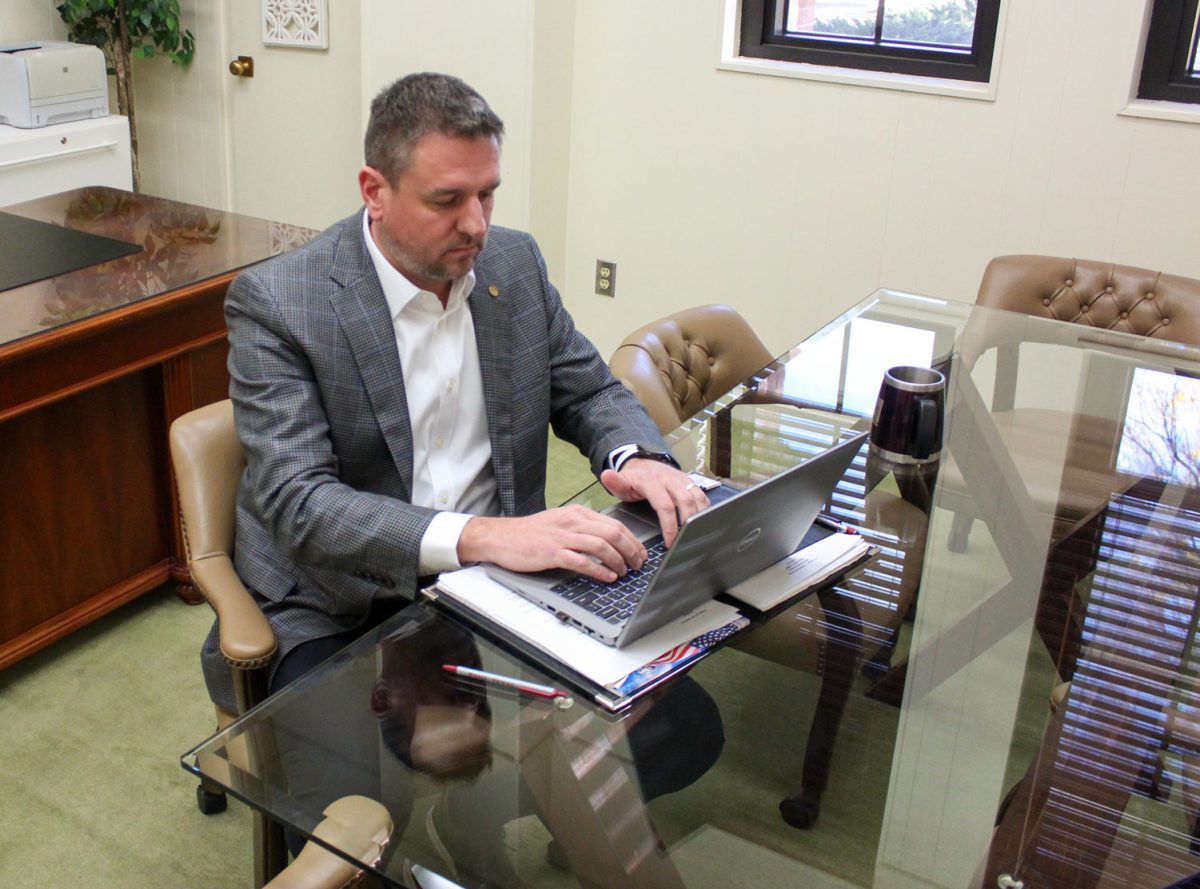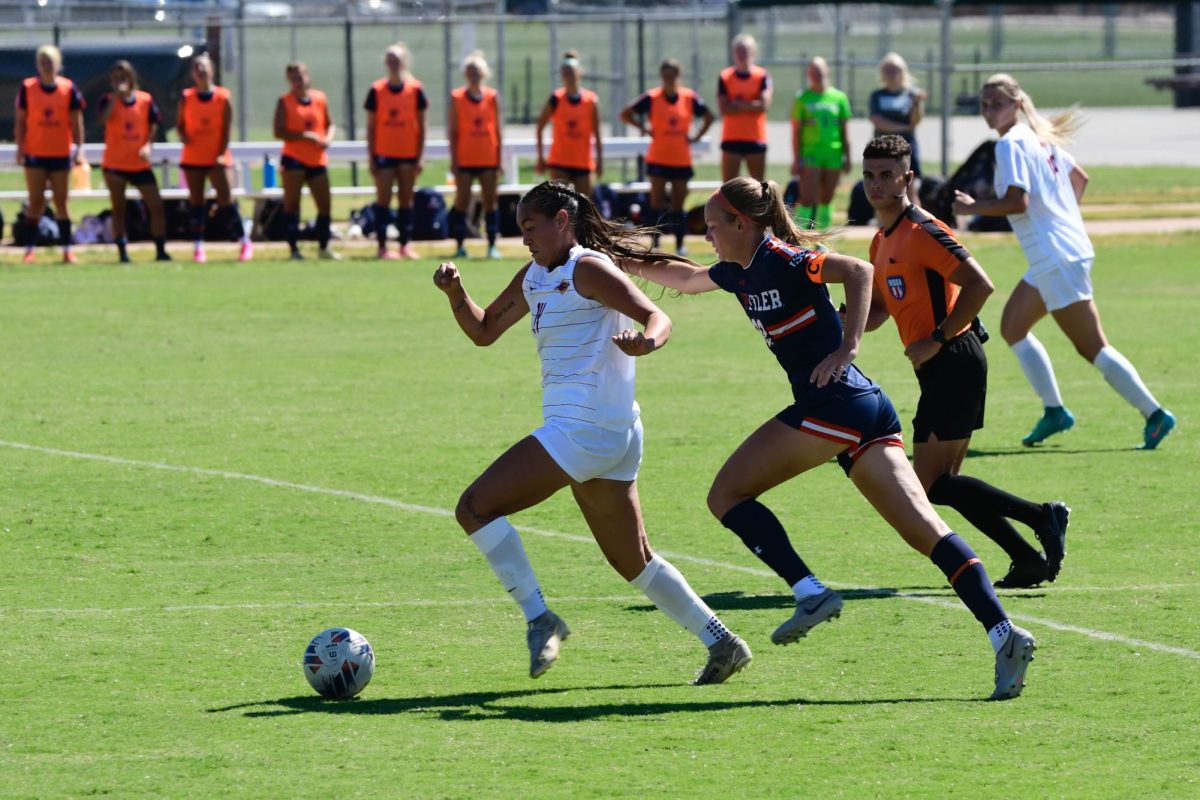The stereotypical picture of the Wild West wouldn’t be complete without the gun-totin’ outlaw.
To say that the Second Amendment is considered a basic right in West Texas would be considered an understatement.
And the pictures of Texans with shotguns mounted on the back of their pickup trucks probably isn’t too far from the truth.
Now, given the passage of state legislation allowing students to carry guns on campus, officials have been charged with developing a policy about when and where students will be allowed to exercise their Second Amendment freedoms.
Background
On June 1, the Texas State Senate passed SB 11, the Campus Carry bill and sent the bill to Gov. Gregg Abbot for his signature. It took less than two weeks for Abbott to sign the bill. Private schools, universities, and commercial college campuses throughout the state have made their voices and opinions heard regarding the bill, but the passing of Campus Carry has some specific implications for the students and staff here.
The legislation makes it a requirement for Texas public universities to permit licensees to carry concealed handguns in classrooms, dorms and other campus buildings.
“The legislation was originally created in response to a number of campus shootings, in particular the one that really stood out to lawmakers was Virginia Tech,” said Laura Fidelie, associate professor of criminal justice.
The deadliest school shooting since the 1966 University of Texas Massacre took place at Virginia Tech. That day Seung-Hui Cho shot and killed more than 30 people. Since the shooting at Virginia Tech, 43 other shootings have occurred on university and community college campuses. Of those incidents, two occurred in Texas: one in Austin and the other in Houston.
“Had those violent incidents not taken place there I don’t think it was necessarily something that lawmakers had on their agendas,” said Fidelie.
Legislative mandate
With the high profile and controversial nature of the topic there have been numerous voices from both ideological perspectives pushing the Texas government in both directions on this issue. Taking that into consideration lawmakers have given provisions attached to the bill to appease naysayers. For example, universities can choose to designate gun-free zones in strategic locations throughout the campus as well as where and how firearms will be carried and stored based on public safety concerns.
Fidelie said, “The legislation has been set up so that we do have flexibility within the bill to make it work on this particular campus. With that flexibility we can make this a positive thing within the MSU community.”
The university president, as required, appointed a task force made up of representatives from the faculty, students, community, alumni, parents, as well as officers from police. The task force’s primary goal is to draft a policy that will implement the law and protect safety and submit that policy to the Board of Regents. Two of the specific tasks they will be taking on are setting guidelines for how firearms will be stored in campus housing and determining where gun-free zones will be located on the premises.
“Our number one goal here is to keep students safe and create and maintain an environment that is conducive to learning,” Fidelie said. “The question our task force will have to answer is: How can we allow this legislation to work on this campus and still preserve the environment that students really need to have academic freedom and to be able to discuss ideas freely in the classroom?”
“It will provide a certain degree of safety for our students,” Caleb Nichols, management senior, said.
Nichols is also over the age of 21, has his Concealed Handgun License, supports campus carry and regularly carries a gun in a majority of the places he goes.
“I would absolutely campus carry,” Nichols said. “Obviously when you make weapons available to people it makes that place inherently more dangerous, but the building that I have most of my classes in, there are no locks on the doors, it’s one straight hallway all the way down, there simply is not any real way to protect yourself unless you’re armed. In that manner I think it is very beneficial.”
Parts of the Clark Student Center and library are unlocked and open 18 hours a day, six days a week. During the regular school hours most buildings and rooms remain unlocked and easily accessible.
“If shootings are going to happen then universities are an ideal place for them to happen,” Jeremy Duff, an assistant professor of political science, said. “Think about our school. It’s wide open; it takes a significant amount of time for university police to respond to an incident, and there is essentially no security on campus.”
Duff added that he believes that the likelihood of any mass school shooting occurring in the near future is slight to none.
Duff said, “It is an interesting dynamic to think about really, how universities are the optimal spot for a shooting to take place however these instances are incredibly rare. The university isn’t going to turn into the Wild Wild West or anything like that. I would be shocked that on any given day I have more than one to two students in any of my classes who was carrying.”
Contrasting beliefs
However there is a notion that contrasts that belief. Anti-gun activists claim that allowing guns on college campuses are only raising the probability of such extreme events to take place. The heightened tension that comes from pressure during classes and exams coupled with the emotional instability college students go through each semester is already overwhelming.
Fidelie said,”It is something that is a concern for us. The last thing we would want is to escalate tension.”
Whether or not the passing of the bill will lead to an actually physical violent act Duff commented that there will be a definite affect on the mentality the students on our campus will experience.
“The main concern is that in the beginning students and professors will come to class with the new notion that someone in their classroom might be armed,” Duff said. “Whether that fear is rational or irrational true threat it is going to affect the classroom and the student-teacher relationship.”
Nichols said the situation shouldn’t potentially cause panic. If anything he believes that it should cause students to feel bettered protected.
“I know most of my friends have spent most of their time working with weapons and so they’re experienced with it, to them firearms aren’t a toy,” Nichols said.
Determining effectiveness of the new law will be a challenge since shootings on college campuses are rare.
“There is really no way to test this,” Duff said. “We have never had a before and after. If there were no campus shootings before and we don’t have any shooting afterward, is that because the policy worked? Or because there was no threat? At the same time if for some reason we do have a campus shooting it would only prove the law to be ineffective.”
The widespread knowledge and acceptance of students for the new Campus Carry law varies. Some students are profoundly opinionated either for or against.
“It will be interesting to observe the type of response this will generate from our students. I honestly don’t know what to expect, but that is why it is important for our task force to make the most of the responsibilities we are given and making the best decisions,” Fidelie said.
In transitioning positively, our faculty and task force has quite a bit of work left to do. Whether it be training staff and students, finding safe and smart locations for gun-free zones, mental health background checks, and numerous other aspects of preparation.
“The most prominent question our university have to answer is how can we execute the parameters of this bill without impeding on our students inherent freedoms. Other than that though, at this time at least, we have no real way to judge its effectiveness. We can prepare as much as possible but really we will just have to wait and see,” she said.
MORE INFORMATION
Campus Carry Task Force
First meeting: Oct. 2, 11 a.m., Priddy Conference Room, Dillard
Chair
- Laura Fidelie, Gunn College of Health Sciences and Human Services
Faculty Representatives
- Jeff Blacklock, West College of Education
- Susan Harvey, Fain College of Fine Arts
- Laura Martin, Dillard College of Business Administration
- Beverly Stiles, Prothro-Yeager College of Humanities and Social Sciences
Dr. Roy Vogtsberger, College of Science and Mathematics
Staff Representatives
- Dawn Fisher, director of human resources
- Reagan Foster, counselor, counseling center
- Julie Gaynor, director of Marketing and Public Information
- Jim Hall, network services manager
- Angie Reay, interim director of residence life
- Dan Williams, chief of police
Student Representatives
- Dustin Whinery, undergraduate student
- Leann Duran, graduate student
Alumni Representative
- Jeff Hughes
Parent Representative
- Oku Okeke
Task Force Resource and Support Staff
- Debbie Barrow, Director of Board and Government Relations
- Barry Macha, General Counsel












